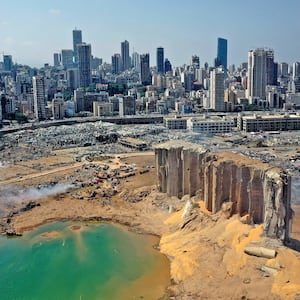A letter from Lebanese security officials warning that the 2,750 metric tons of ammonium nitrate dangerously stored in the port of Beirut could destroy the city was sent to both the prime minister and the president in late July, according to Reuters.
The new information underscores the level of incompetence over the handling of the infamous port that led to a catastrophic blast that killed more than 200 people, injured 6,000, and destroyed 6,000 buildings, leaving more than a quarter of a million people homeless.
According to documents seen by Reuters, an investigation into what led to the blast currently underway by the General Directorate of State Security includes a private letter from officials about the explosives that was sent on July 20 to President Michel Aoun and Prime Minister Hassan Diab.
Diab and his entire cabinet stepped down Monday night, but they have been asked to stay in place in a caretaker role until a new government can be formed. Angry protesters took to the streets once again calling for action, including the resignation of the president, who has been in power since 2016.
The demonstrators and many in the Lebanese diaspora have also called for an international investigation, but Aoun ruled that out, telling the press that no “foreign interference” was necessary.
Previous reports show that the deadly cargo was offloaded from a Russian-owned cargo ship en route to Mozambique in 2014. Numerous letters by various authorities to the government warned that anything could spark the ammonium nitrate and blow up the city, exactly as it did.
Reuters also reports that a judicial investigation had been conducted in January 2020 to finally address the explosives. “There was a danger that this material, if stolen, could be used in a terrorist attack,” an unnamed official who was involved with the July letter told Reuters. “At the end of the investigation, Prosecutor General (Ghassan) Oweidat prepared a final report which was sent to the authorities.”
The official told Reuters, “I warned them that this could destroy Beirut if it exploded.”






